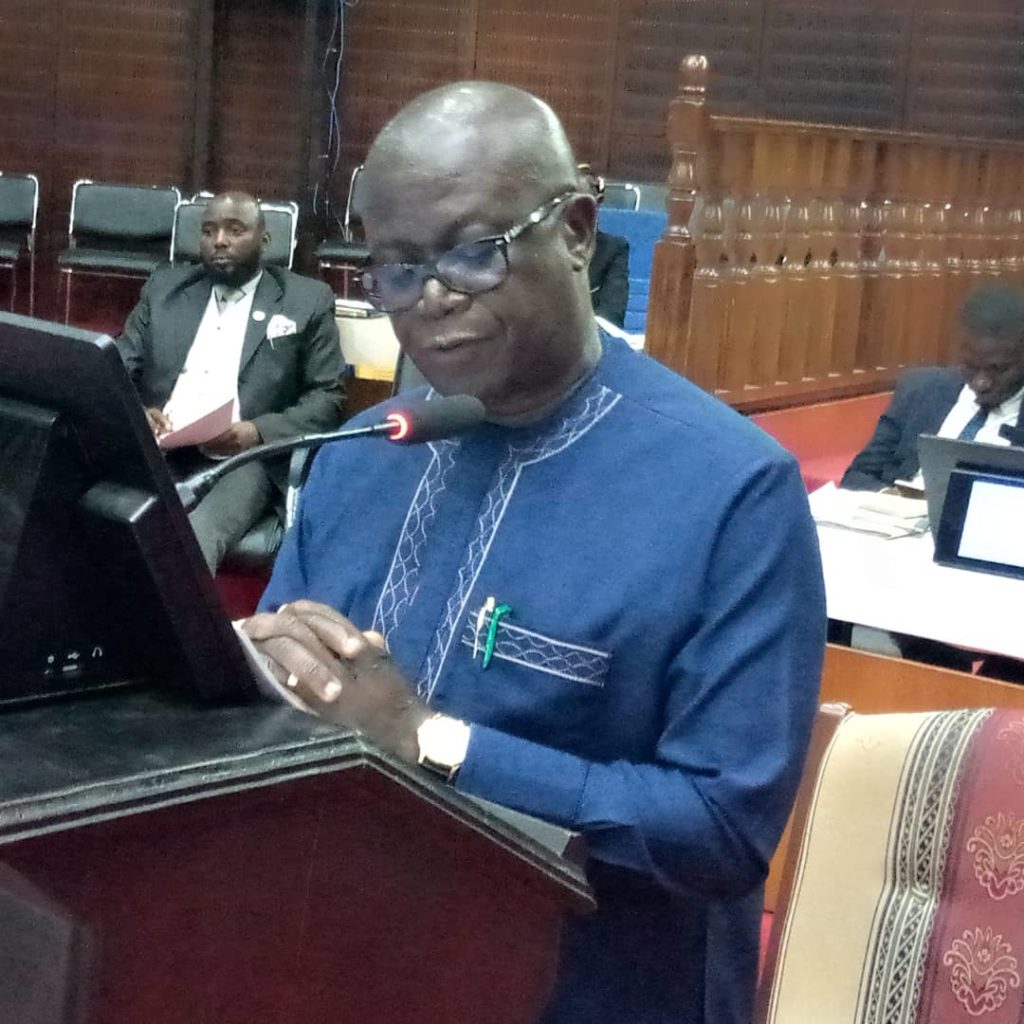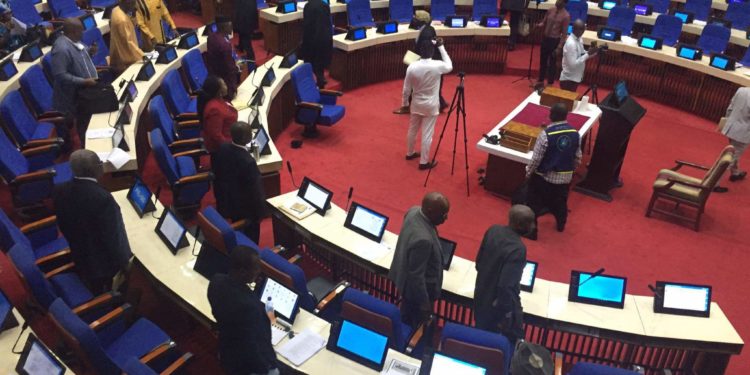The Fifth Parliament of the Second Republic of Sierra Leone on Tuesday 8th February voted unanimously to extend the tenure of local councillors, including mayors and district chairpersons from four to five years per term.
The move was taken with the passing of the ‘The Local Government (Amendment) Act 2022’.
While tabling the bill to lawmakers for both second and third reading, Tamba Lamina, Minister of Local Government and Rural Development, explained the purpose of the piece of legislation, noting that it was meant to increase the tenure of office from four years to five years for local councillors, including mayors and chairpersons of district councils.
Mr Lamina cited Section No. 5 of the Local Government Act, 2004 which provides for Local Council elections to be held every four years, adding that Section 5 subsection 1 of the Local Government Amendment Act 2016 provides for Local Council election to be held every four years. He noted further that subsection 2 of the law provides that where Local Council elections were due under the section but localities have not been divided into wards following clause 2 of the Wards Boundary Delimitation Regulations 2008, Constitutional Instrument No 2 of 2008, “the President shall on the recommendation of the Electoral Commission by statutory instrument direct that each election is postponed.”
“Section 3 provides that where the Local Council elections are postponed under sub-section 2, the tenure of the Councilors shall be extended for a period not exceeding six months. Or until the Electoral Commission shall have divided the localities into wards whenever is the earliest,” the minister said.
Lamina explained further that the reasons for the postponement was to save resources, noting that “the economy of Sierra Leone is presently embattled by COVID-19 pandemic. This has negatively affected revenue mobilization in the country. Evidence shows that the same amount of resources to be allocated for the conduct of the 2022 Local Council elections will be used in the 2023 general and presidential elections. Consequently, the government in its desire to minimize expenditure and maximize the efficient use of national revenue and other resources has prudently reasoned the need to postpone the Local Council elections from 2022 to 2023.”
The minister said that the postponement will enable the country to expend revenue for the singular conduct of multiple (presidential and local council) elections in 2023.
“The savings from the postponement of the Local Council elections will be expended in other important areas of public attention and need,” Lamina stressed, pointing to Section 38 subsection 8 of the Constitution which provides for the Electoral Commission to cause the register of voters to be reviewed and revised at least once every three years. The last exercise, he noted, was undertaken from February to June 2017.
“This means that the existing register of voters should have been updated at least once before the end of 2020,” Lamina noted.
He added: “However, Section 25. (B) of the National Civil Registration Act 2016 provides for the Director-General of the National Civil Registration Authority (NCRA) to provide dates to the National Electoral Commission of Sierra Leone to undertake the preparation of the register of voters. This bill has the strongest recommendations of the elections observation mission from the 2018 elections. NCRA is to provide for the provision of dates for citizens within the voting age or bracket for the preparation of the register of voters. This process needs to be completed before the conduct of local council elections.”

Local Government Minister Tamba Lamina. Image, Parliament of Sierra Leone
According to Lamina, the postponement of Local Council elections to 2023 “will provide the Electoral Commission of Sierra Leone the opportunity to update the register of voters for the benefits of voters in Sierra Leone. This ensures that all eligible voters are included in the register for the 2023 elections.”
Lamina also said that the alignment of village localities in the Western Area Rural District is to be properly structured in terms of electoral boundaries and registration of voters.
“The Western Area Rural District contains villages whose heads are elected by universal adult suffrage. The existing village boundaries are obsolete and require a realignment for the village head elections to be successfully conducted in the Western Area Rural District. The realignment will ensure that everybody, every voter in the district is assigned to an electoral center and the boundaries of the said villages are also realigned. This is due to the extensive expansion of these localities. Therefore, there is the need for these boundaries to be properly defined and realigned to the electoral centers, wards and constituencies,” he said.
The Local Government Minister however stressed that the postponement is in concurrence with the Electoral Commission of Sierra Leone, adding that it will allow the government to save a huge sum of national resources and for the Electoral Commission to update the register of voters, delimits and aligned the boundaries.
“The above-mentioned reasons are beneficial to the state and the people. This is because the end product of the postponement process will be a win-win situation. It will ensure that every eligible voter is included into the register of voters hence provide them with the right to exercise their franchise in 2023 elections as per law,” Lamina said.
Having explained the spirit of the amendment of the bill, lawmakers were given the floor to make contributions.
Hon. Abdul Karim Kamara of the main opposition All Peoples Congress (APC) from Kambia said that the extension of the tenure of Local Councils based on the fundamental reasons advanced by the Minister was as easy as saying that “we do not have money to run the next elections.”
He said that he was taken aback on whether to amend the laws based on what the Minister stated, which he said raised several unanswered questions.
“It seems as if we are caught pants down. As intelligent human beings it warrants people to know or discern because what the Minister is telling us is contrary to what we have here. We need to critically look at the factors that he has listed, or else this will create a whole lot of controversy, and I am afraid we need to educate our people more,” Hon. Kamara said.
Presiding Speaker, Hon. Solomon Sengehpoh Thomas, reminded the House that as per law the country is already late for the election, stating that “because the laws are to be followed then we should be conducting local council elections next months, which is impossible. This nation cannot conduct elections next month or in the next months. There is no way we can cure a situation like this without an amendment. If we decide to conduct the elections in 2023, without this amendment, it becomes illegality, except probably we decide to rely on the supreme executive power of the president to appoint chairmen, mayors, or councillors, otherwise, there is nothing that we can do about it and we do not want that as a nation. That to us will be undermining our democracy, so as it is, there is nothing that we can do other than amend the law. If we say we are not going to do anything about this, then conducting local council elections after probably one or two months from now becomes illegality, which we cannot tolerate as a Parliament.”
Similar comments in support of the motion to amend the law were registered by Hon. Daniel Koroma (APC), Hon. Saa Emerson Lamina (C4C), Hon. Francis A. Kaisamba and Hon. Moses Jorkie (SLPP).
Without any controversy, the acting Leader of the APC (Hon. Daniel Koroma) and the Leader of the SLPP (Hon. Mathew S. Nyuma) all agreed that the bill should be amended, following which, Mr. Speaker’s question received a resounding “yes” from across the aisle for the amendment to be made.
The bill was therefore amended with a few changes, and it now awaits the president’s assent for it to become law.






















